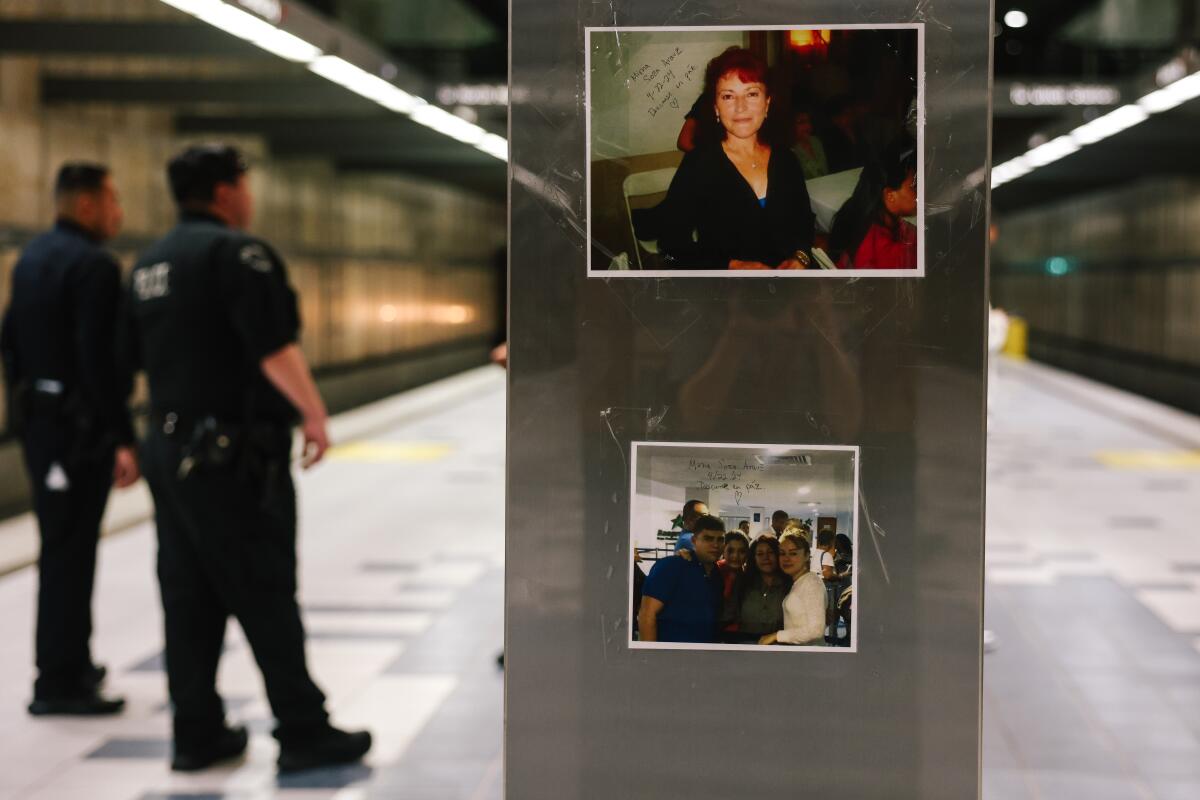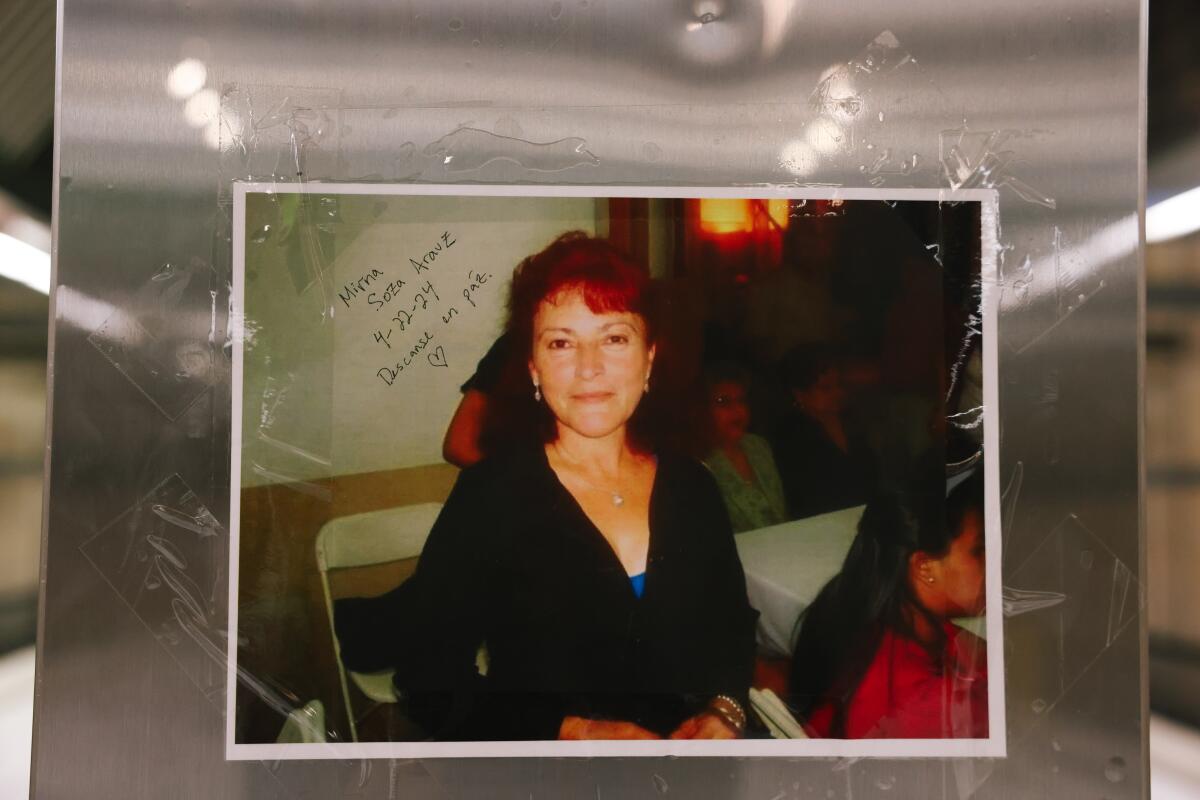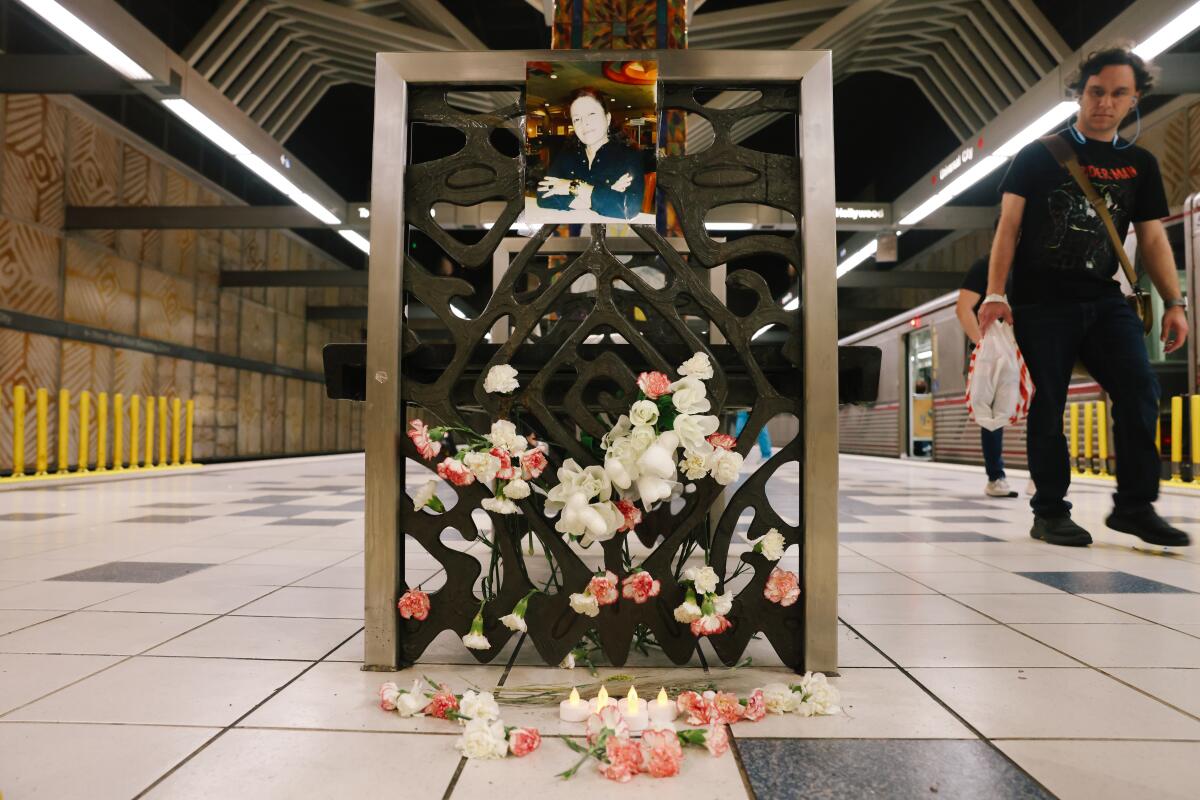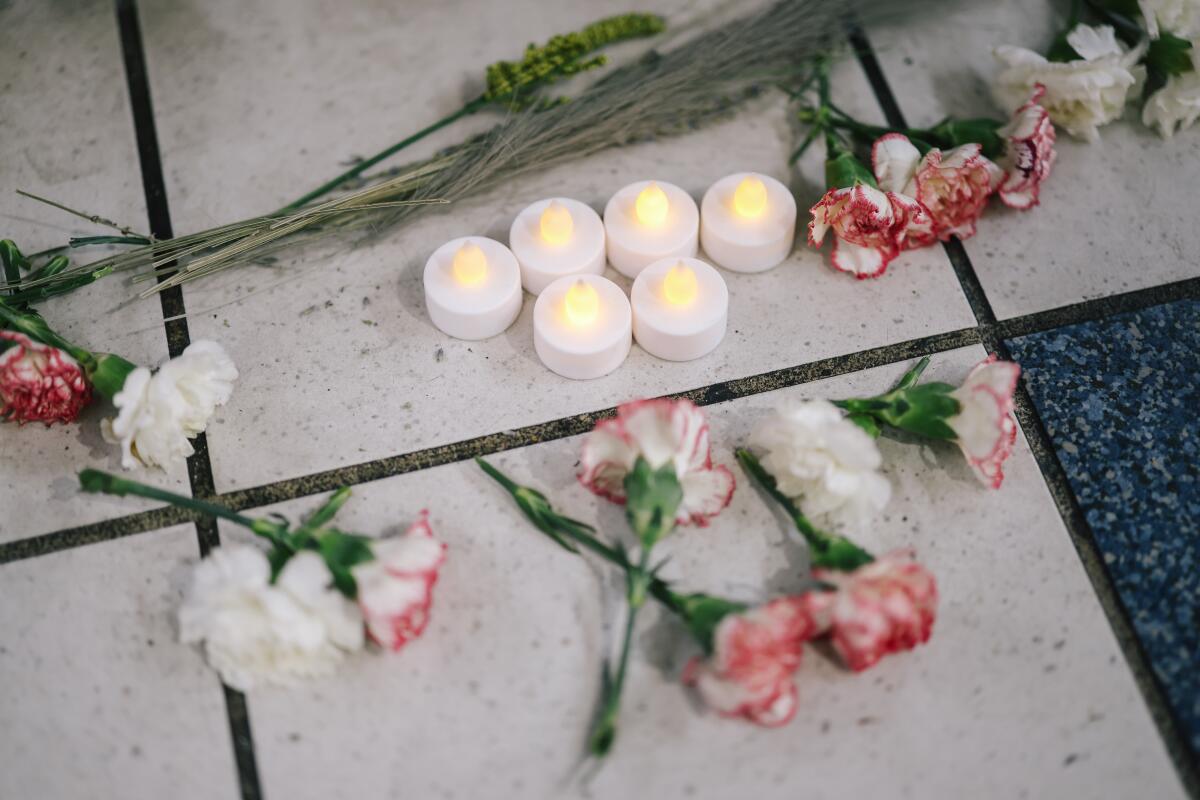From a Tommy’s security job to a ride home on Metro, her last hours alive

- Share via
The train pulled into the North Hollywood station Monday at 4:45 a.m., and I boarded with a handful of other riders headed south.
This was the same line a security guard had taken on April 22 after getting off work at a Tommy’s burger joint.
It was the last trip of her life, before she became the victim of an unprovoked stabbing on this train.
Her slaying, so senseless, random and unsettling, wrecked her family and shook the city. I can’t explain exactly why I felt the need to retrace her steps. Maybe it was simply an attempt to know her a little better.
The doors whooshed closed. The train left the station. Next stop: Universal/Studio City.
::
California is about to be hit by an aging population wave, and Steve Lopez is riding it. His column focuses on the blessings and burdens of advancing age — and how some folks are challenging the stigma associated with older adults.
Mirna Soza Arauz was her name. Age — 67. Mother of three with seven grandchildren. Although most of us could not have known her, as the details of her life emerged, she became recognizable.
Soza Arauz was an immigrant with a goal, and she chased it in Los Angeles. She was one of the tens of thousands of front-line workers who take up their posts each day at low-paying jobs in a high-rent region, trying to climb a ladder that keeps getting taller.
The heart of the city could not beat without them.
She was saving up for a planned move back to Nicaragua in the next year or so, a family member told me, which is why — in a place built for cars — Soza Arauz rode buses and trains, even when it became risky to do so.
Recently, two stabbings on buses made headlines in a 24-hour period, one involving a driver and the other a 70-year-old passenger.

“I will not ride our transit system by myself. I’m afraid,” L.A. County Supervisor and Metro board member Kathryn Barger said last week as Metro declared a safety emergency after Soza Arauz’s killing and called for stepping up security measures, including the use of facial recognition technology.
But so many people have no other transportation options, and the region does not function without them.
So what are they to do with their fear?
When people can’t commute to and from work, school and the business of the day without fear, when we become suspicious of those around us and the most vulnerable among us are placed in the greatest peril, those failures are our failures.
We can tighten transit security, but we’d do better to create a society in which buses and trains don’t become last-resort mobile shelters for the homeless, mentally ill and addicted.
Arauz Soza “was stabbed without provocation by a man who grabbed the bag she was holding,” according to L.A. Dist. Atty. George Gascón. Her accused killer has a criminal record that includes a 2019 attack on another Metro train passenger. He pleaded no contest and under terms of probation was ordered to stay away from Metro trains, but how would anyone have enforced such an order?
::
On Monday, before I boarded the train at the North Hollywood station, I drove to the Tommy’s in North Hills, thinking all the while about the last hours of Soza Arauz’s life, about the inconvenience of her nightly trek all the way down to South Los Angeles, where she and a son lived together.
Her Tommy’s Original is across from the Budweiser plant on Roscoe Boulevard. I arrived just before 4 a.m., and already, a new security guard — Soza Arauz’s replacement — was on the job. He was watching over the parking lot, which sits next to a littered lot that fronts a vacant, graffiti-tagged building.

Armando Rubio, 56, told me he didn’t know Soza Arauz, but he knew her fate. He said he was attacked several years ago working as a security guard at a South Los Angeles motel.
“I was in a coma,” Rubio said, jutting his chin and pointing to his lower teeth. “They’re implants.”
Tommy’s doesn’t open its doors until 6 a.m., but the drive-through is open all night. I ordered a coffee and the employee at the window told me Soza Arauz usually caught the 152 bus at the stop across the street, at Roscoe and Haskell Avenue. The manager, Jose Murillo, said he didn’t know much about Soza Arauz. She showed up, did her job, went home and came back again and again.
“It’s so sad,” he said.
I followed in my car as the 152 cut through the darkness heading east for several miles along Roscoe, collecting its cargo of early risers on their way to their posts, doing the work that keeps the city going. Men, women, young, old, almost all people of color. The bus wheeled south at Lankershim and pulled into the North Hollywood Metro station.
I parked, crossed a dark street, and minded my own business while taking in everything around me. One young man stood and stared, for no obvious reason, in the parking lot near the station. I hated feeling somewhat on edge, thinking about what could go wrong instead of all that was going right in the morning rush. We lose a piece of our humanity when suspicion creeps into our being.
I wondered about Soza Arauz — nearly my own age — with no choice but to be vulnerable, in the dark, alone.
I rode an escalator to the platform, where passengers were already awaiting the next train. When it arrived, I boarded and one man pushed a bike onto the same car. I sat near a middle-aged man and tried to strike up a conversation, but he kept to himself.
Among the several people on our car, two or three looked like they might be homeless. One got up and moved to another car. Another, a young woman, seemed anxious. She turned sharply in her seat, shouted something and banged her hand hard on the back of the seat of a man across the aisle from me.
He didn’t look up from his phone. A woman near us avoided eye contact.
It’s a quick five-minute ride to the Universal/Studio City station. Somewhere on that stretch, police say, Soza Arauz was attacked.
She was a security guard, but unarmed, tired, and defenseless.
What could she have been carrying that was worth stealing?

The train stopped. I stepped onto the platform and noticed some flowers had been placed on a bench.
This was it, the place where Soza Arauz had stumbled out of the car as her assailant fled.
Someone had taped a photograph of her to the bench. Two more photos were taped to a nearby column and someone had written “descanse en paz” (rest in peace) next to a heart. Soza Arauz had reddish brown hair. She wore earrings, a bracelet, a faint smile and a look of contentment.
Andres Rios was waiting to board a train to his downtown job as a hotel maintenance man. He knew about the killing and told me he’s a bit nervous as a regular rider. There’s not enough security in place, he said.
Two private security guards in yellow vests were walking the platform and I asked one of them if he was on duty the day Soza Arauz was attacked. Alex Salvador, 24, said he was one of the responders. He said he held her hand and encouraged her to try to hang on as she bled on the floor.
“I was talking to her,” he said, and Soza Arauz was still conscious, but “she couldn’t talk.”
Minutes later, she was rushed to Cedars-Sinai, where she died.
In the last few days, family members have been making funeral arrangements, planning one service in Los Angeles and another in Nicaragua. I spoke to and texted Juan Castillo, her son-in-law, who lives in Managua, Nicaragua. He said Soza Arauz’s body would be flown home, and that an outpouring of donations to a GoFundMe page were greatly appreciated.
“She was ... that hardworking everyday citizen that works and busts their behind to put food on the table, who is the backbone of a family — who has family back in their native land waiting for them to return,” Castillo said.
He told me Soza Arauz knew the safety risks on public transit but didn’t think that she, as an older woman, would be targeted.
“She used to help out the homeless and she would have helped out this guy. If he had been in need of food or clothes or anything, she would gladly have helped him out,” Castillo said.
The killer didn’t “destroy just one life. He destroyed the life of a whole family and extended family.”
He destroyed more than that, and the city should be mourning the loss.
steve.lopez@latimes.com
More to Read
Sign up for Essential California
The most important California stories and recommendations in your inbox every morning.
You may occasionally receive promotional content from the Los Angeles Times.














